Japan PMI Shows Manufacturing Weakened, Dragged By Drop In Exports To China

Japan manufacturers are less confident than expected this month after China’s slowdown resulted in the biggest drop in exports in three years, dealing another blow to the prime minister’s “Abenomics” plan. Meanwhile, a China report showed business sentiment fell anew there.
The Markit/Nikkei Flash Japan Manufacturing Purchasing Managers Index (PMI) fell to 50.2 in February compared with economists’ expectations of 52 and January’s 52.3, Reuters reported. That’s just barely above the 50-level that indicates growth in purchasing managers indexes, which combine data on new orders, inventories, production, supplier deliveries and jobs.
The report is a sign that businessmen aren’t confident that the government and the Bank of Japan’s moves to boost the economy are working or will work, not even the BOJ’s January decision to cut the interest rate it charges banks to below zero. That means banks have to pay the BOJ to park money there, which is meant to encourage them to lend more aggressively instead.
A big probable reason for manufacturers’ lack of confidence: exports, which a report last week showed fell 13 percent in January, dragged by an 18 percent decline in sales to China. Shipments to China may not improve soon. A survey of companies listed on the Shanghai and Shenzhen stock exchanges showed business sentiment fell to 49.9 in January from 52.3 in December. Numbers below 50 indicate pessimism, and probably fewer purchases from Japan and other countries.
"The BoJ’s negative interest rate approach is expected to stimulate the economy later this year, however, Japan is currently feeling the aftershocks of the global crunch," according to Donald Levit, a strategist at EconomicCalendar.com. "In the meantime, current data does not paint an optimistic picture of the Japanese economy," he said, adding that the BOJ may implement more stimulus at its March 14 meeting depending on other data that will be released before then.
The Nikkei 225 rose, reversing earlier losses, which Bloomberg attributed to a slight weakening of the yen. A weak yen makes Japanese exports more competitive. But Japan stocks have risen in the past on poor economic news, which stokes speculation that Prime Minister Shinzo Abe and BOJ President Haruhiko Kuroda will take further steps to boost the economy.
© Copyright IBTimes 2024. All rights reserved.











